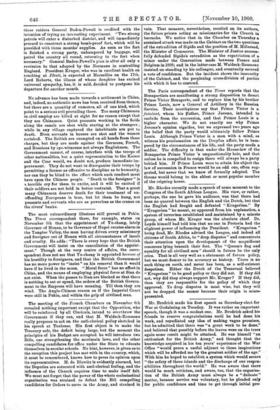The meeting of the French Chambers on November 6th revealed
nothing important except that the Opposition, who will be reinforced by all Clericals, intend to overthrow the Government if they can, and that M. Waldeck-Rousseau really proposes to act on the anti-clerical policy sketched in his speech at Toulouse. His first object is to make the Treasury safe, the deficit being large, but the moment the principles of his Budget are accepted he will introduce two Bills, one strengthening the mortmain laws, and the other compelling candidates for office under the State to educate themselves in secular schools. No hint, however, is given as to the reception this project has met with in the country, which, it must be remembered, knows how to press its opinion upon its representatives. M. de Blowitz is evidently alarmed, but the Deputies are saturated with anti-clerical feeling, and the influence of the Church requires time to make itself felt. We must not forget that the power of the whole ecclesiastical organisation was strained to defeat the Bill compelling candidates for Orders to serve in the Army, and strained in
vain. That measure, nevertheless, recoiled on its authors, the future priests acting as missionaries for the Church in barracks. We notice that in the Chamber on Thursday a sustained attack was made on the Cabinet on the two questions of the extradition of Sipido and the position of M. Millerand, the Minister of Commerce. The Minister of Justice success- fully defended Sipido's extradition as the repatriation of a minor under the Convention made between France and Belgium in 1898; and in the latter case M. Waldeck-Rousseau insisted on standing by his colleague, and eventually secured a vote of confidence. But the incident shows the insecurity of the Cabinet, and the perplexing cross-division of parties with which it has to contend.






































 Previous page
Previous page